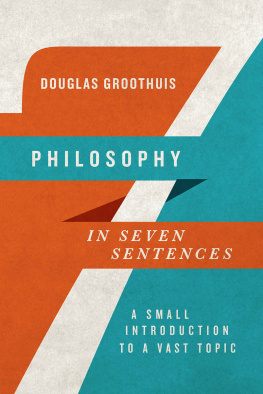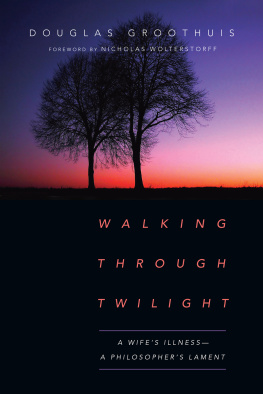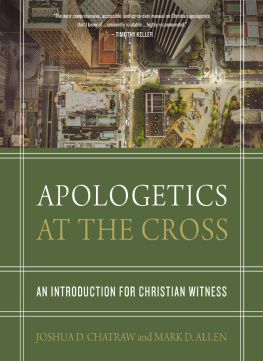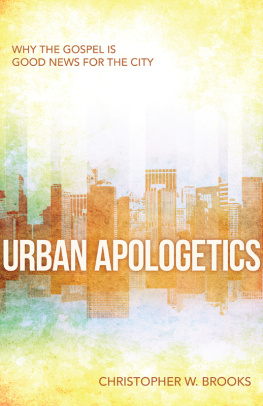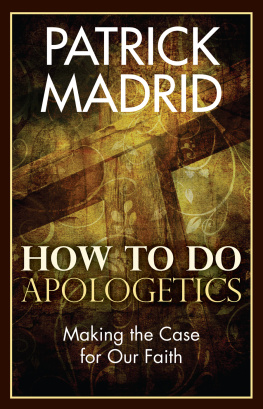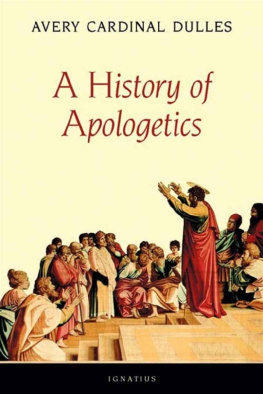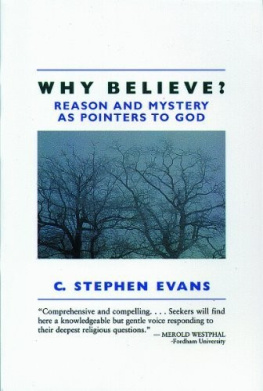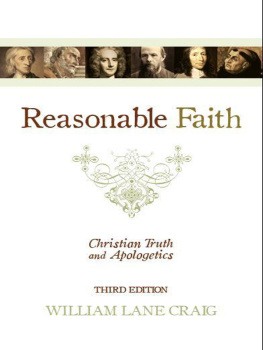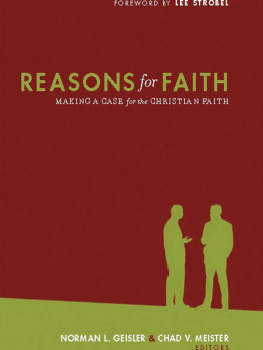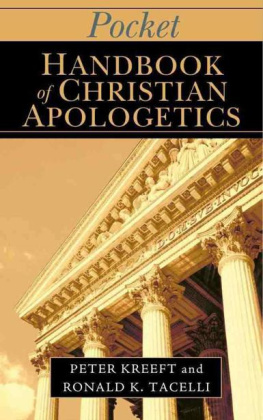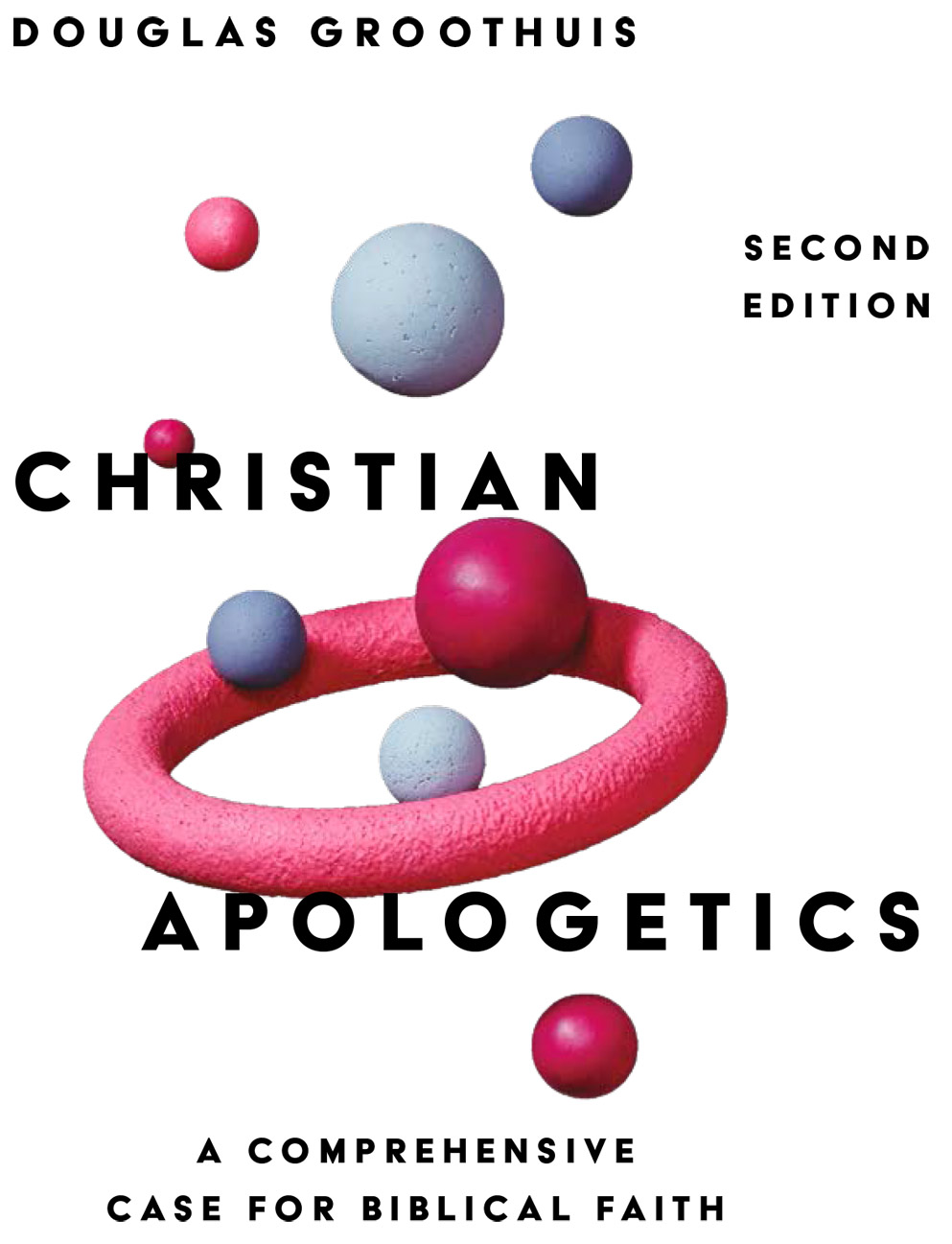Sommaire
Pagination de l'dition papier
Guide
InterVarsity Press
P.O. Box 1400, Downers Grove, IL 60515-1426
ivpress.com
Second edition 2022 by Douglas Groothuis
First edition 2011 by Douglas Groothuis all rights reserved. No part of this book may be reproduced in any form without written permission from InterVarsity Press.
InterVarsity Press is the book-publishing division of InterVarsity Christian Fellowship/USA, a movement of students and faculty active on campus at hundreds of universities, colleges, and schools of nursing in the United States of America, and a member movement of the International Fellowship of Evangelical Students. For information about local and regional activities, visit intervarsity.org.
All Scripture quotations, unless otherwise indicated, are taken from The Holy Bible, New International Version, NIV. Copyright 1973, 1978, 1984, 2011 by Biblica, Inc. Used by permission of Zondervan. All rights reserved worldwide. www.zondervan.com. The NIV and New International Version are trademarks registered in the United States Patent and Trademark Office by Biblica, Inc.
While any stories in this book are true, some names and identifying information may have been changed to protect the privacy of individuals.
The publisher cannot verify the accuracy or functionality of website URLs used in this book beyond the date of publication.
Cover design and image composite: David Fassett Image: Abstract spheres Eugene Mymrin / Moment / Getty Images
ISBN 978-1-5140-0276-6 (digital)
ISBN 978-1-5140-0275-9 (print)
This digital document has been produced by Nord Compo.
To Rebecca Merrill Groothuis (19542018),
astute and intrepid editor,
dedicated follower of Jesus Christ,
and beloved wife of thirty-three years
Preface to the Second Edition
I OWE THE READER an account of why there is a second edition of Christian Apologetics. This already-large book (which I call the doorstop or the brick) has grown even larger. A necessary condition for a second edition was that the first edition sold well and has been used in many seminaries and Christian colleges. So the demand was there. For that, I am grateful to God.
After teaching my book for several years, I realized that I had omitted significant material, that chapters needed to be updated, and that certain material could be omitted. Some chapters remain nearly the same as the first edition (such as The Ontological Argument), but most have been significantly updated and revised. (Drs. Blomberg and Hess have kindly updated their fine chapters as well.) For example, in the chapter, Distortions of the Christian Worldviewor the God I Dont Believe In, I have added a section on sexual identity in light of recent LGBTQ concerns. I have also added sections on contractarianism, evolutionary morality, and Derek Parfit in the chapter The Moral Argument, and much more. The resurrection chapter has become two chaptersone on miracles in general and one defending the resurrection of Jesus in particular.
The heft of this already hefty book is due largely to the addition of seven new chapters: Original Monotheism challenges the claim that monotheism evolved from primitive animism or polytheism, something taught in many religion classes at universities. The Argument from Beauty is an aesthetic-design argument that may touch people that more technical design arguments may not. Doubt, Skepticism, and the Hiddenness of God concerns questions of whether there is sufficient evidence for Christianity, given so much unbelief. Perhaps the most important additions are two chapters on the atonement, The Atonement: Stating It Properly and The Atonement: Defending It. The first edition heartily defended orthodox understanding of the person of Christ, but did not speak enough to the work of Christ as our Savior. Also, the first edition lacked any defense of the church. Jesus came to build his church, not simply give evidence for a worldview. In a day when people think they can be spiritual without being religious and can dispense with organized religion, a defense of the church is imperative. Thus, the chapter, In Defense of the Church. The final new chapter is Lament as Christian Apologetic, which argues that Christianity equips the believer to suffer well and with meaning, which is itself an apologetic.
Much of my life as a Christian philosopher has been dedicated to apologetics, and I am grateful while in my midsixties to present a new edition of my major work on that grand topic. May God use it to equip his people to defend the faith given once for all to the saints (Jude 3) so that many enter into the eternal and abundant life that only Jesus Christ can give (Jn 3:16; 10:10).
Acknowledgments
THIS SECOND EDITION OF Christian Apologetics comes out of my Christian life and all who have contributed to it. Since this book is as close to a magnum opus as I will ever have, I should thank as many people as possible who, in one way or another, contributed to its existence. However, I will attempt to be mercifully brief.
A number of people were instrumental in my intellectual development as a Christian philosopher. Karsten Musaeus taught an undergraduate course on worldviews (The Twilight of Western Thought: A Christian Response) through the Sociology Department at the University of Oregon in the late 1970s that significantly shaped my thinking. I later taught this course for nearly five years. Our faculty sponsor, Dr. Benton Johnson, professor of sociology at the University of Oregon, was most gracious and helpful in preserving this rather offbeat class from being censored by secular attacks. During that time (19791984) I worked for the McKenzie Study Center, a Christian think tank focused on the University of Oregon. My thanks go to the Centers director, Wes Hurd, for giving a young, idiosyncratic, aspiring thinker a lot of room to develop his skills in campus ministry and in writing. Of great encouragement during this formative time was also Richard Beswick, a campus minister with whom I would later work at the University of Oregon. My gratitude also goes to two of my best friends, Stuart Smith (19442019) and Pat Knapp, who have given me so much encouragement and insight on my Christian pilgrimage. My mother, Lillian Groothuis Dunn (19302010), was a lifelong encourager and supporter. I owe to her more than a few words could possibly say, and I miss her.
Professor Keith Yandell (19382020) was my adviser at the University of Wisconsin-Madison, where I received my MA degree in philosophy in 1986. From Keith I learned the rigors and virtues of analytic philosophy and what it could mean for Christian philosophers. My doctoral adviser at the University of Oregon was Robert Herbert (d. 2006), who further sharpened my thinking by being a devout critic whose seldom-heard praise could keep me going for weeks.
Editor Andrew Le Peau, of InterVarsity Press, exercised great patience and accommodation when the first edition of this book doubled in size and became a textbook. He never rushed me but provided encouragement for me to write the kind of book I had to write. Many thanks to David McNutt and Rebecca Carhart for their good work on the second edition. Thanks also go to Sarah Geis, who provided great help in adjusting footnotes, compiling the bibliography, finding parallel biblical texts and doing other literary chores that freed me up to finish the main manuscript. The Denver Seminary library staff provided me with needed interlibrary loan material in short order. I am also grateful to the leadership of Denver Seminary for granting me sabbatical time that helped greatly in writing this work.


